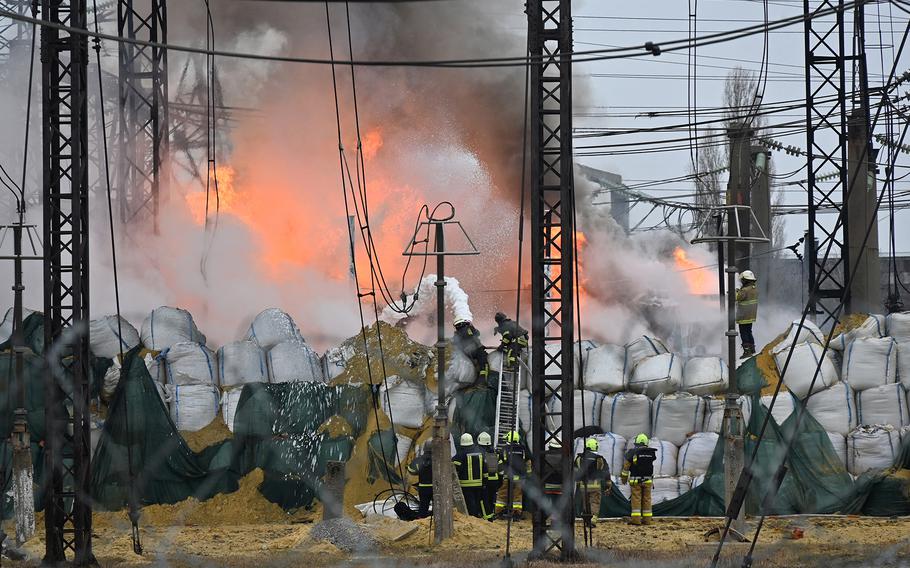Europe
Record Russian missile barrage disrupts Ukraine power system
Bloomberg March 22, 2024

Firefighters extinguish a fire at an electrical substation after a missile attack in Kharkiv, on March 22, 2024, amid the Russian invasion in Ukraine. (Sergey Bobok/AFP/Getty Images/TNS)
Several Ukrainian regions suffered power outages after the largest missile and drone attack on the country’s energy infrastructure since the start of the Russia’s invasion in 2022, prompting President Volodymyr Zelenskiy to again urge foreign allies to accelerate military aid.
“This was, probably, the largest attack of all time against Ukraine’s energy system,” national grid operator Ukrenergo CEO Volodymyr Kudrytskyi said on local TV.
In a statement, Russia’s defense ministry said its forces had made “a massive strike against facilities of the energy sector, the military-industrial complex, railway hubs, arsenals” and locations where Ukrainian troop formations and “foreign mercenaries” were stationed.
Certain “foreign military equipment” delivered to Ukraine by NATO countries had been also destroyed and transfers of equipment to the front lines disrupted, according to the ministry.
Power supply has been deliberately limited in some regions in order to avoid overloading the non-damaged parts of the grid, according to the grid chief.
Ukraine’s air defense intercepted less than half of the 88 missiles, which affected electricity generation and transmission systems across the country early Friday, Zelenskiy said on his Telegram channel. Most of an estimated 63 drones were taken down.
Moscow’s goal is to disable Ukraine’s power system via the same means as last year, Energy Minister German Galushchenko said in an emailed statement.
“Russia’s missiles are not facing delays like military aid packages to our state. Shahed drones don’t have indecision like some politicians,” Zelenskiy said as he urged Ukraine’s allies not to delay with providing weapons, which will in turn help protect citizens.
Kharkiv, Ukraine’s second largest city, was left almost completely without power after more than 15 strikes on energy facilities, regional governor Oleh Syniehubov said on Telegram. Nearly 700,000 households were without electricity.
Critical infrastructure was also hit in Vinnytsya and Lviv regions and in Kryvyi Rih and Zaporizhzhia, according to statements by regional governors.
At least two people were killed and eight wounded in the western city of Khmelnytskyi and another two in Ivano-Frankivsk in the attacks, the Interior Ministry said. Six people were injured and three are missing in Zaporizhzhia, where missiles struck a residential neighborhood. Recovery efforts continue.
One of the remaining power lines that link the occupied Zaporizhzhia nuclear plant to the Ukrainian power grid automatically switched off because of disruptions in transmission, the nuclear operator Energoatom said on Telegram. The link was restored after five hours, the International Atomic Energy Agency said on X, formerly Twitter.
The Dnipro hydro power plant in Zaporizhzhia, Ukraine’s largest, was also targeted, causing a fire and destroying one of the dam’s supports, Ukrhydroenergo CEO Ihor Syrota, whose state-owned company operated all hydro-electric facilities in Ukraine, said in a video interview to Radio Liberty. The plant’s generating capacity has been seriously damaged, but there’s no immediate risk of flooding, he said.
Thermal power plants run by the energy producer DTEK were seriously damaged, the company said in a statement. State-run Naftogaz said some of its equipment was damaged.
Ukrainian Railway reported that several areas of its network lost power and trains were being sent on roundabout routes.
Prime Minister Denys Shmyhal said on Telegram there was no need for emergency power cuts from the strikes.
EU Energy Commissioner Kadri Simson is convening an urgent meeting of ministers in the international Advisory Council for Ukraine in response to the overnight attacks, according to an EU official. The council includes several EU member states, Canada, Japan, UK, US and representatives of the International Energy Agency and the energy community.
Friday’s missile and drone strikes came a day after Kremlin forces targeted Kyiv with at least 31 missiles, the first large-scale attack on Ukraine’s capital since February, and less than a week after Russian President Vladimir Putin was re-elected.
The barrage directed at Kyiv included 29 cruise missiles and two ballistic rockets, Ukrainian Air Forces commander Mykola Oleshchuk said Thursday on Telegram. Air defence downed all the missiles and no fatalities were reported.